Career Growth in Nursing: Tips and Advice for Advancing Your Career
Nursing is a dynamic and rewarding profession that offers numerous opportunities for career growth and advancement. However, navigating the various nursing career paths and identifying the skills, education, and resources needed to progress can be challenging. In this article, we explore the essential tips, advice, and strategies you need to advance your career in nursing.
Understanding the Different Nursing Career Paths
Before we delve into the specifics of advancing your nursing career, it’s crucial to understand the different career paths available to nurses. Below are some of the most common nursing career paths:
Registered Nurse (RN)
RNs are the backbone of the nursing profession and provide patient care in various healthcare settings, including hospitals, clinics, and nursing homes. RNs administer medications, monitor patients, and collaborate with other healthcare professionals to provide comprehensive patient care.
As an RN, you’ll have the opportunity to work in a variety of specialties, including paediatrics, oncology, critical care, and emergency medicine. You’ll also have the opportunity to advance your career by pursuing additional education and certifications.
One of the benefits of being an RN is the flexibility of the job. You can work full-time, part-time, or even per diem. You can also choose to work in a hospital, clinic, or nursing home setting, depending on your preferences.
Nurse Practitioner (NP)
NPs are advanced practice nurses who diagnose and treat acute and chronic illnesses, prescribe medications, and order and interpret diagnostic tests. NPs work in primary care, specialty care, and acute care settings, and collaborate with physicians and other healthcare professionals to deliver high-quality patient care.
As an NP, you’ll have the opportunity to work independently or as part of a healthcare team. You’ll also have the opportunity to specialise in a particular area of healthcare, such as cardiology, oncology, or paediatrics.
One of the benefits of being an NP is the autonomy of the job. You’ll have the ability to diagnose and treat patients, prescribe medications, and order diagnostic tests without the oversight of a physician.
Clinical Nurse Specialist (CNS)
CNSs are advanced practice nurses who specialise in a particular patient population, disease category, or healthcare setting. CNSs provide expert consultation to other healthcare professionals, develop and implement evidence-based practice guidelines, and advocate for quality patient care.
As a CNS, you’ll have the opportunity to work in a variety of settings, including hospitals, clinics, and nursing homes. You’ll also have the opportunity to specialise in a particular area of healthcare, such as oncology, critical care, or paediatrics.
One of the benefits of being a CNS is the ability to make a significant impact on patient care. You’ll be responsible for developing and implementing evidence-based practice guidelines, which can improve patient outcomes and quality of care.
Nurse Anesthetist (CRNA)
CRNAs are advanced practice nurses who administer anaesthesia to patients in various healthcare settings, including hospitals, surgical centres, and dental offices. They provide preoperative and postoperative care, monitor patients during surgery, and manage anaesthesia-related complications.
As a CRNA, you’ll have the opportunity to work independently or as part of a healthcare team. You’ll also have the opportunity to work in a variety of settings, including hospitals, surgical centres, and dental offices.
One of the benefits of being a CRNA is the high level of autonomy and responsibility. You’ll be responsible for administering anaesthesia, monitoring patients during surgery, and managing anaesthesia-related complications.
Nurse Midwife (CNM)
CNMs are advanced practice nurses who specialise in maternal and reproductive health. They provide prenatal, postpartum, and gynaecological care, including contraception and family planning services. CNMs attend births and collaborate with physicians and other healthcare professionals to ensure safe and healthy outcomes for mother and baby.
As a CNM, you’ll have the opportunity to work in a variety of settings, including hospitals, birthing centres, and clinics. You’ll also have the opportunity to work independently or as part of a healthcare team.
One of the benefits of being a CNM is the ability to develop long-term relationships with patients. You’ll provide care throughout the entire pregnancy and postpartum period, which can be incredibly rewarding.
Essential Skills for Career Advancement in Nursing
Regardless of the nursing career path, there are specific skills that nurses need to advance their careers. These skills are not only essential for career growth but also for providing high-quality patient care. Here are some additional details on each of these skills:
Leadership and Management
Effective leadership and management are crucial for advancing in nursing. Nurses in leadership roles must be able to motivate and empower their teams to provide high-quality patient care. They must also be able to delegate tasks efficiently and manage resources effectively. Additionally, they must be able to create a positive work environment that promotes collaboration and communication among team members.
Communication and Interpersonal Skills
Nurses must possess excellent communication and interpersonal skills to build positive relationships with patients, families, peers, and other healthcare professionals. They must be able to convey information clearly and empathetically, listen actively, and respond appropriately to patients’ and families’ needs. They must also be able to collaborate with others to achieve common goals, such as providing optimal patient care.
Critical Thinking and Problem Solving
Nurses must be able to think critically, solve problems, and make decisions based on evidence and best practices. They must also be able to adapt to changing situations and prioritise patient needs amidst competing demands. Critical thinking skills are essential for identifying potential problems, analysing data, and developing effective solutions that improve patient outcomes.
Adaptability and Flexibility
Nursing is a constantly evolving field, and nurses must be able to adapt to new technologies, treatments, and healthcare delivery models. They must also be flexible and willing to work in various settings and schedules. Additionally, they must be able to adjust their care plans to meet the unique needs of individual patients, such as those with complex medical conditions or cultural differences.
Time Management and Organisation
Nursing is a fast-paced profession that requires nurses to manage multiple tasks and priorities simultaneously. Nurses must be able to prioritise tasks, manage time effectively, and stay organised to provide safe and efficient patient care. They must also be able to document patient care accurately and efficiently, ensuring that all necessary information is recorded for future reference.
Overall, possessing these essential skills is critical for nurses who want to advance their careers and provide high-quality patient care. By continually developing these skills, nurses can improve patient outcomes, enhance their professional reputation, and achieve their career goals.
Pursuing Higher Education for Career Growth
As the healthcare industry evolves, so does the demand for highly-educated nurses. Obtaining a Bachelor of Science in Nursing (BSN) or Master of Science in Nursing (MSN) degree can open up numerous opportunities for career growth and advancement. Below are some of the benefits of pursuing higher education in nursing:
Benefits of Obtaining a BSN or MSN
One of the primary benefits of obtaining a BSN or MSN degree is the specialised knowledge, skills, and competencies needed for leadership and advanced practice roles. These degrees provide nurses with a deeper understanding of patient care, healthcare systems, and evidence-based practice.
In addition to higher earning potential, obtaining a BSN or MSN degree can lead to broader career choices. Nurses with advanced degrees can pursue roles in research, education, administration, and specialised clinical practice areas.
Lastly, pursuing higher education in nursing can lead to increased job satisfaction. Nurses who pursue advanced degrees often report feeling more fulfilled in their roles and having a greater sense of purpose in their careers.
Choosing the Right Nursing Program
When choosing a nursing program, it’s essential to consider factors such as reputation, accreditation, curriculum, cost, and location. Nurses should also explore the different degree options, such as traditional, online, and accelerated programs, to find one that fits their learning style and career goals.
It’s also important to consider the program’s faculty and resources. Does the program have experienced faculty members who are actively involved in the nursing field? Does the program provide opportunities for clinical experience and hands-on learning?
Nurses should also consider the program’s accreditation. Accreditation ensures that the program meets certain standards of quality and prepares graduates for licensure and certification exams.
Balancing Work, School, and Personal Life
Pursuing higher education while working and attending to personal obligations can be challenging but not impossible. Nurses can find support from their employers, peers, family, and online resources to achieve work-school-life balance.
Many employers offer tuition reimbursement or flexible work schedules to accommodate employees who are pursuing higher education. Nurses can also connect with peers who are also pursuing higher education to share tips and resources.
Online resources, such as time management apps and study groups, can also help nurses balance their work, school, and personal obligations.
Networking and Building Professional Relationships
Networking and building professional relationships can help nurses stay informed about industry trends, gain new knowledge and skills, and access new career opportunities. Below are some tips for building a strong professional network:
Joining Professional Nursing Organisations
Professional nursing organisations offer nurses the opportunity to connect with peers, attend conferences and workshops, and access resources and tools to advance their careers.
Attending Conferences and Workshops
Attending conferences and workshops can provide nurses with opportunities to gain new knowledge and skills, network with peers and experts, and stay informed about industry trends and best practices. Nurses should explore various conference options, such as local, national, and international events, to find one that fits their interests and schedule.
Networking Tips for Nurses
To build professional relationships, nurses should attend networking events, reach out to peers and mentors, and connect on professional platforms like LinkedIn. They should also be prepared to pitch their skills and career goals, ask thoughtful questions, and follow up with their contacts.
Building a Strong Professional Network Online
Nurses can also build a strong professional network online by creating a professional website or blog, participating in online forums and groups, and engaging with peers and experts on social media. They should also protect their online reputation and be mindful of privacy and security concerns.
Seeking Mentorship and Continuing Education
Mentorship and continuing education are pivotal for career growth and development in nursing. Nurses who seek mentorship and pursue continuing education opportunities are better equipped to provide high-quality care, advance their careers, and make a positive impact in their communities. Below are some strategies for finding a mentor and pursuing continuing education opportunities:
The Importance of Mentorship in Nursing
Mentorship can provide nurses with guidance, support, feedback, and challenges needed to grow and advance in their careers. A mentor can be a valuable resource for nurses who are navigating the complexities of the healthcare system and seeking to improve their clinical skills, leadership abilities, and professional networks. Mentors can be found in various settings, such as the workplace, nursing school, and professional organisations.
For example, a nurse who is interested in pursuing a career in critical care might seek out a mentor who has expertise in this area and can provide guidance on how to acquire the necessary skills and experience. A mentor can also help a nurse navigate workplace politics, advocate for their professional development, and provide emotional support during challenging times.
Finding a Mentor in Your Workplace
To find a mentor in your workplace, nurses should identify a role model or expert in their field, build a rapport, and communicate their goals and expectations. Nurses should approach potential mentors with a clear idea of what they hope to gain from the relationship and be open to feedback, follow through on commitments, and express gratitude for their mentor’s time and investment.
For example, a nurse who is interested in developing their leadership skills might seek out a nurse manager who has a track record of successful leadership and ask to shadow them or participate in leadership development programs. Alternatively, a nurse who is interested in pursuing a research career might seek out a nurse scientist who can provide guidance on research design, grant writing, and publication.
Pursuing Continuing Education Opportunities
Pursuing continuing education opportunities, such as continuing nursing education (CNE) courses, conferences, and certification programs, can help nurses enhance their knowledge, skills, and competencies and stay up-to-date with best practices and standards. Nurses should explore various continuing education options, such as online courses, self-study modules, and live events, to find one that suits their learning style and schedule.
For example, a nurse who is interested in learning more about evidence-based practice might enrol in an online course on this topic or attend a conference that features keynote speakers who are experts in this area. Alternatively, a nurse who is interested in pursuing a certification in a specialty area might seek out study materials and resources to prepare for the certification exam.
Staying Updated on Industry Trends and Best Practices
Nurses should also stay informed about industry trends and best practices by reading professional journals, attending webinars and podcasts, and participating in online communities. They should also seek feedback from their colleagues and patients and reflect on their own practice to identify areas for growth and improvement.
For example, a nurse who is interested in staying up-to-date on the latest research in their field might subscribe to a professional journal and attend a journal club where they can discuss current articles with their peers. Alternatively, a nurse who is interested in improving their patient communication skills might participate in role-playing exercises with colleagues or seek feedback from patients on their communication style.
In conclusion, mentorship and continuing education are essential for nurses who want to stay current and advance their careers. By seeking out mentors, pursuing continuing education opportunities, and staying informed about industry trends and best practices, nurses can enhance their knowledge, skills, and competencies and provide high-quality care to their patients.
Preparing for Job Interviews and Advancement Opportunities
Preparing for job interviews and advancement opportunities can be a daunting task for nurses. However, with the right preparation and mindset, it can be an exciting opportunity to showcase your skills and experience and secure your dream job. Below are some tips for preparing for job interviews and advancing in your nursing career:
Updating Your Nursing Resume
A well-crafted nursing resume can make a significant difference in securing a job interview. Nurses should ensure that their resume is up-to-date, accurately reflects their skills and experience, and is tailored to each job they apply for. Highlighting achievements and accomplishments, using action-oriented language, and providing quantifiable metrics can make a resume stand out from the competition.
It is also essential to ensure that the resume is visually appealing and easy to read. Using bullet points, bolded headings, and white space can make the resume easier to scan, ensuring that the recruiter or hiring manager can quickly identify the most relevant information.
Acing the Job Interview
A successful job interview requires thorough preparation, confidence, and professionalism. Nurses should research the organisation they’re applying to, including its mission, values, and culture. This information can help nurses tailor their responses to the interview questions and demonstrate their suitability for the role.
It is also essential to practise common interview questions and prepare responses that highlight your skills, experience, and achievements. Dressing appropriately, showing enthusiasm and interest in the job, and maintaining eye contact can also help to make a positive impression on the interviewer.
Negotiating Salary and Benefits
Negotiating salary and benefits can be an uncomfortable topic for many nurses. However, it is essential to ensure that you’re fairly compensated for your skills and experience. Nurses should research salary and benefit trends in their industry and develop a negotiation strategy that considers their needs and priorities.
It is also essential to be prepared to articulate your value and contributions to the organisation. Providing examples of how you have contributed to patient care, improved processes, or increased revenue can help to demonstrate your worth to the organisation.
Transitioning to a New Role or Specialty
Transitioning to a new role or specialty can be an exciting opportunity for nurses to broaden their skills and experience. However, it can also be a challenging and overwhelming experience. Nurses should seek additional education and training, network with peers and experts, and gain hands-on experience through volunteering or shadowing to prepare for the transition.
It is also essential to be open to feedback and constructive criticism and willing to adapt and learn. Seeking mentorship from experienced nurses or other healthcare professionals can also be a valuable resource in navigating the transition.
In conclusion, preparing for job interviews and advancement opportunities requires thorough preparation, confidence, and professionalism. By updating your nursing resume, acing the job interview, negotiating salary and benefits, and transitioning to a new role or specialty, nurses can stand out from the competition and secure their dream jobs.
Conclusion
Career growth and advancement in nursing require dedication, hard work, and a commitment to lifelong learning. By understanding the different nursing career paths, developing essential skills, pursuing higher education, building a strong professional network, seeking mentorship and continuing education, and preparing for job interviews and advancement opportunities, nurses can achieve their career goals and make a meaningful impact on patient care.
Make sure to contact JMB Nurses where we can help you find a role in Sydney.







